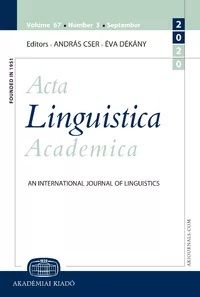SVO – Attractor in the declarative-to-procedural shift in grammar evolution
SVO – Attractor in the declarative-to-procedural shift in grammar evolution
Author(s): Hubert HaiderSubject(s): Syntax
Published by: Akadémiai Kiadó
Keywords: evolution of grammar; word order; SVO; SOV; Universal Grammar
Summary/Abstract: Diachronic changes in phrase or clause structure are vectored rather than oscillating. A century ago, E. Sapir identified a drift towards fixed word order and another one towards the invariant word (including the levelling of the forms for subject and object marking). What is still missing is a theory that predicts such drifts. As will be argued, the theory that explains Sapir's observations and, in passing, makes the concept of Universal Grammar dispensable is the theory that grammars are targets and products of cognitive evolution. Sapir's drifts are shifts from systems based primarily on the consciously accessible declarative network to systems based on the consciously inaccessible procedural network. This also explains why the [S[VO]] clause-structure is a point of no return and why languages do not change in the reverse direction, starting from a grammar like English and eventually moving to a grammar like Sanskrit.
- Issue Year: 70/2023
- Issue No: 2
- Page Range: 195-218
- Page Count: 24
- Language: English
- Content File-PDF

